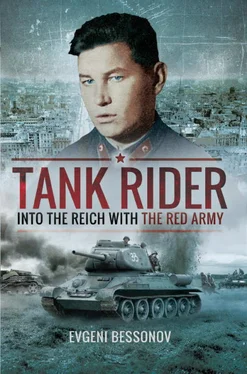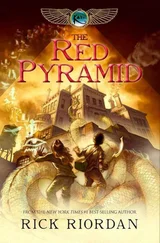We left the suburbs of Lodz, and again my platoon on three tanks was ahead of the Brigade. I had already mentioned that the Army’s, Corps’ and Brigade’s task was to advance to the Oder as quickly as possible and establish a bridgehead on its western bank, in area next to Keben (northwards from Wroclaw). Having travelled some 50 kilometres from Lodz, we stopped for a rest, in order to refuel tanks, replenish ammo and have a nap, if the situation allowed it. After all, in seven days, from 12 to 18 January, we had travelled over 200 kilometres in heavy fighting. In 24 hours we would travel up to 50 kilometres almost without any sleep. We were quite exhausted. Penetrating deep into the enemy’s rear, we were supposed to capture good river crossings and destroy enemy reserves, if we could not bypass them. Our rest was short and on the night of 21 January we moved on. The Poles did not meet our warriors with the same attitude everywhere. Some met us with joy, others with distrust. Sometimes villages did not have a single living soul – all the villagers would escape as soon as they heard the news of approaching Russian tanks.
Once, when the battalions stopped for a break after a day-long march, I was ordered to move forward with five tanks in the night and capture an important road junction. The commander of the tank regiment Stolyarov personally led the task force, and I was on his tank. Suddenly we spotted Fritzes, and Stolyarov asked me: ‘What should we do?’ ‘Crush them!’ I answered. He dispatched this order to all the tanks over radio. It was actually clear that we did not have any other choice. The Germans were superior to us in numbers, but owing to the element of surprise, we smashed the well-armed unit into pieces. My soldiers displayed miracles of bravery, decisiveness and fearlessness in the running battle. Some stayed on tanks, while others dismounted. Trucks and APCs were burning, their crews abandoned some of them, dead bodies of German soldiers were all around. We even managed to burn two Tiger tanks, while all the surviving German infantry fled. For some reason we did not manage to take any prisoners, all the surviving Germans ran off. The remains of the column managed to disappear in the darkness, and we did not pursue them. The way forward for the Brigade was open.
My soldiers were coming up to me, excited and happy with their victory. We captured some war booty, but it was not the main thing, the main thing was our success. This shows the importance of the element of surprise in a night attack. The Germans did not expect such boldness from us, and did not organize the security of the column as they usually did. They paid dearly for this. For some reason I remember that battle very well, probably because of our success and the absence of losses on our side.
In our joy we even had a bit of a drink and drank a symbolic toast to Stolyarov and his tank crews. We slaughtered so many Germans in that battle, that even Stolyarov, an experienced front line commander, got sick, but alcohol got him back into shape. Until dawn we moved forward, fulfilling the order given to us. We stopped in a village to get ourselves warm and stayed there till evening, waiting for the main body of the Brigade.
During the night of 22 January the Brigade moved on. From that time on our company was riding on JS-2 tanks instead of T-34 in front of the Brigade. The Brigade was reinforced with three such vehicles.
We moved at high speed, overtaking the German units that were retreating on other roads; we were also travelling at a significant distance from our infantry units. The situation called for a lightning speed advance, in order to deprive the Germans of the chance to man the defendable and sometimes already fortified areas, especially the ones along the Oder. On the night of 23 January we rushed into Ostruv and after a short but stubborn battle we captured the town. It was in that town that the Germans used Panzerfausts for the first time against our tanks, but they missed. We did not stay in that city for long, although the city had warehouses stuffed full of food, while we were already out of it and we should have picked it up from there – our field kitchen fell behind, as usual. Having quickly left the city, we moved on. I made myself very comfortable behind the turret of a JS tank, as the space over the tank’s engine was much larger than that of a T-34, and fell asleep. I slept so well that I did not even notice that our column had stopped.
As it happened, the Brigade commander with his staff had travelled with our battalion that night. They woke me up, and I jumped off the tank and walked forward. There I saw a JS-2 tank lying on its side on the ice of the frozen river. One could hear groaning and desperate pleas from under the tank. For some reason no one was brave enough to assist the suffering men. I did not think long, and crawled under the tank and pulled four soldiers one by one from under the tank. It turned out that they were safe and sound, but a bit squashed and really scared. There were three or four soldiers more under the tank, but they had been crushed by the tank. As it turned out, the first JS-2 tank safely drove across the bridge, but the bridge could not stand the weight of the second tank and it fell on its right side, pressing against the ice those who sat on the right side, as well as the tank commander. Those soldiers who sat on the left side of the tank, were thrown to the sides and they got off with some bruises. I was on the third tank. One of the soldiers that I pulled out later became my orderly – it was Andrey Ulianovich Drozd. I went through the rest of the war with him.
My soldiers wandered off to the huts in order to warm themselves and have a snack. An orderly found me at the capsized tank and informed me that Brigade commander Turkin had called me. I ran up to the Colonel and reported with all due ceremony. Majors Skryago, Kozienko, Stolyarov and someone else was there. Turkin told me: ‘Bessonov, order your soldiers not to execute any of the Germans who are in the village houses.’ I said, ‘Yes’ and ran to fulfil the order.
There were indeed Germans in the village. My guys were kicking them out of the houses, taking away their weapons. If a German resisted, they would finish him off, but in other cases they did not harm them at all. However, they confiscated all the Germans’ watches. I ordered them to draw all the German soldiers up in column of two, but not to harm them. ‘We were not going to execute them,’ squad leaders told me, ‘we just took their weapons.’ I came back to the Brigade commander and reported that his order had been fulfilled: all prisoners had been gathered from the huts and formed up. No one was planning to execute them. I noticed that in front of Turkin there was a tall guy standing at ‘attention’ in German uniform. The guy was holding a garrison cap on the bend of his arm and was reporting to Turkin clearly in Russian. It turned out that the man was an Uzbek. According to him, in 1941 he had graduated from Tashkent infantry academy as a Lieutenant and was taken prisoner by the Germans in 1942. Then he was a commander of a construction or security company with a rank of Ober-Leutenant (A Senior Lieutenant in our rank system). His company included almost every nationality of Europe: Russians, Ukrainians, Poles, Belorussians, Frenchmen, Czech and others, some 60 to 80 men. According to him, there was a German battalion staff and two companies of German soldiers in the nearby village. That village was not on the main route of our advance and we did not go there.
Colonel Turkin ordered the Ober-Leutenant to lead all his soldiers eastwards, into captivity, but did not order any security to escort them. I have no idea where they went. In my opinion they most likely just scattered.
No matter how hard the tank crews tried, they could not put the tank back on its tracks, and we had to leave it there. The Brigade in the meantime moved on, sometimes engaging the enemy in short clashes. We were held up with the capsized tank anyway.
Читать дальше












